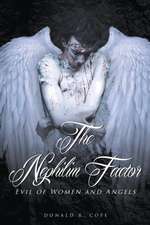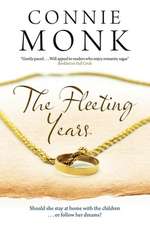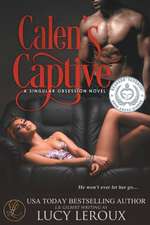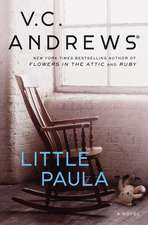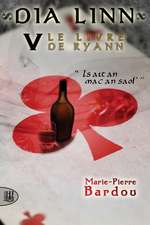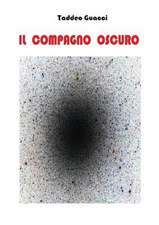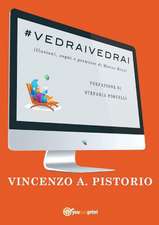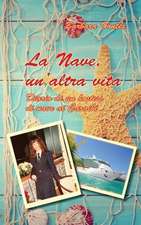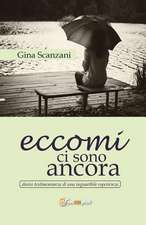Eden's Children: The Eden Series, cartea 1
Autor V.C. Andrewsen Limba Engleză Paperback – 23 noi 2022
When former teacher Paula Eden adopts Faith and Trevor, she is astounded by their natural intelligence and decides to homeschool them to nurture their brilliance. But as the years go on, Faith and Trevor itch for more independence.
When Faith sets her sights on a handsome young man visiting from out of town, Paula grows increasingly desperate to preserve her small family and her plans for the children to carry on her legacy. Luckily, she has a cohort in loyal Trevor, who will do anything to please his mother, even at the risk of hurting his sister and potentially changing their lives forever.
| Toate formatele și edițiile | Preț | Express |
|---|---|---|
| Paperback (1) | 63.83 lei 3-5 săpt. | +10.26 lei 7-13 zile |
| Gallery Books – 23 noi 2022 | 63.83 lei 3-5 săpt. | +10.26 lei 7-13 zile |
| Hardback (1) | 153.64 lei 3-5 săpt. | |
| Gallery Books – feb 2023 | 153.64 lei 3-5 săpt. |
Preț: 63.83 lei
Nou
Puncte Express: 96
Preț estimativ în valută:
12.21€ • 12.75$ • 10.11£
12.21€ • 12.75$ • 10.11£
Carte disponibilă
Livrare economică 14-28 martie
Livrare express 28 februarie-06 martie pentru 20.25 lei
Preluare comenzi: 021 569.72.76
Specificații
ISBN-13: 9781982156367
ISBN-10: 1982156368
Pagini: 400
Dimensiuni: 140 x 213 x 18 mm
Greutate: 0.25 kg
Editura: Gallery Books
Colecția Gallery Books
Seria The Eden Series
ISBN-10: 1982156368
Pagini: 400
Dimensiuni: 140 x 213 x 18 mm
Greutate: 0.25 kg
Editura: Gallery Books
Colecția Gallery Books
Seria The Eden Series
Notă biografică
One of the most popular authors of all time, V.C. Andrews has been a bestselling phenomenon since the publication of Flowers in the Attic, first in the renowned Dollanganger family series, which includes Petals on the Wind, If There Be Thorns, Seeds of Yesterday, and Garden of Shadows. The family saga continues with Christopher’s Diary: Secrets of Foxworth, Christopher’s Diary: Echoes of Dollanganger, and Secret Brother, as well as Beneath the Attic, Out of the Attic, and Shadows of Foxworth as part of the fortieth anniversary celebration. There are more than ninety V.C. Andrews novels, which have sold over 107 million copies worldwide and have been translated into more than twenty-five foreign languages. Andrews’s life story is told in The Woman Beyond the Attic. Join the conversation about the world of V.C. Andrews at Facebook.com/OfficialVCAndrews.
Extras
Chapter One
![]()
one
Mama Eden was whispering in the darkness with the low hall light smothered in the shadows behind her. Streaming through our bedroom windows, the moonlight turned her face into a silvery mask. Her eyes seemed like emerald-green marbles. Her lips were the shade of faded roses.
I could see her airy words turn into bubbles and float over us. There was always something magical about her. Her words often became wondrous things when she spoke. If she was angry, they’d become darts or rocks, and if she was happy, they were drops of honey.
The wind slithered through the cobweb-thin cracks in our window frames, as if Nature was whispering back to her tonight. I knew she thought I was asleep because Trevor was, and she was used to us doing the same things at the same time. Just that morning, Big John had said it was uncanny, “cryin’, laughin’, hungry, thirsty, one wantin’ to do what the other does all the time. Uncanny. You’d think they really were brother and sister—or even Siamese twins.”
We didn’t look alike, so I wasn’t sure why Big John said we were like twins. I had to look up the word uncanny and then think about it, because Mama Eden said she was not surprised and there was nothing uncanny about it. She even chastised him for choosing that word, stressing how normal we were.
“You don’t have to be a brother or sister to be tuned in to someone identical.”
He laughed. “You sure they gave you the right papers, Paula? Maybe I should look at them to check.” He laughed again, his big shoulders trembling.
There were always those seconds of silence during which Big John and I wondered if Mama would go along with his joke or turn angry. Trevor didn’t worry about it like I did. He always seemed more unafraid, almost indifferent to what went on between Mama and Big John, his mind elsewhere. But I held my breath.
“Stop that, John. I know they’re not blood related,” Mama Eden said, fortunately without anger. “Don’t you remember how much time I spent with the adoption agency? There wasn’t anything about them that I didn’t know. And I certainly wouldn’t listen to a word those Wexlers said, or their ugly daughter.”
She had looked at us, her face softer, her eyes calmer. “It’s only natural that they think and feel alike about most everything. Their souls came from the same fountain.”
“Fountain?” Big John rose and shook his head. “I’m not even going to ask,” he said, holding up his big hands, smiling, and walking away.
But the two of us looked at Mama expectantly, Trevor now as interested as I was. Fountain?
“Well, you should,” she shouted after him, and then, like a spring, collapsed back in her kitchenette chair. “You should want to know everything about them. Everything,” she whispered.
“What fountain, Mama?” I asked. I certainly wanted to know everything about us.
She scowled at her husband as he walked on to his den. I didn’t think she was going to answer my question, but she suddenly leaped to her feet and took Trevor and me by the hand to march us to the living room. She told us to sit on the sofa.
“Now, you two pay strict attention to every word I say,” she said. Then she hoisted her thin shoulders back so that she looked taller than five foot five and crossed her arms under her breasts.
Sometimes Mama looked like a wind could come along and carry her off. Big John could lift her over his head with one arm. She weighed barely one-oh-five. All her features were small, childlike, her hands barely bigger than mine. But sometimes, more often lately, she looked as solid as the old oak at the west corner of our property, her feet planted like thick tree roots when she spoke.
Whenever she hugged us both to her slim but surprisingly firm body, I felt her strength. Despite her being less than four or five inches taller than we were, she had to do so much more around the house when Big John was on the road. Her muscles might be small, but they were hard. She could split wood, carry heavy pots of soup or stew across the kitchen or into the dining room, vacuum upstairs and downstairs for hours, polish furniture until it rivaled bright jewelry, and tear beds apart to wash the sheets and blankets herself. Eventually, we were big enough to help with it all, but even then, she rarely took a moment extra to rest.
“My children,” she said when we did help, hugging us to her and then kissing us both on the forehead. “My family.”
She never said one without the other, but I always had the sense that she hugged Trevor just a little bit harder and longer than she hugged me. Maybe that was because he didn’t ask as many questions of her as I did. He did once tell me that I was more thoughtful than he was. “I’m more in a daze, Faith,” he admitted. Big John often told him that. Lately, I sensed he was annoyed by Trevor’s lackadaisical way of doing something he had told him to do or by having to repeat things to him.
“You can’t ignore me, and you can’t be lazy in this house,” he warned Trevor the last time he was home.
Mama came right to Trevor’s defense, embracing him and pulling him back against her, her arms around him.
“Trevor is not lazy,” she said. “You’re not here long enough to witness how much he does for us. He never disobeys me, and he rushes ahead to do a chore even before I think of it or tell him.”
Big John didn’t argue. He rarely argued with Mama now. She could push him and snap at him just like Nanny Too used to snap at us, but he was like an elephant that knew it had to be gentle. He was six foot four and probably weighed close to two hundred and forty pounds, with his broad shoulders and very muscular chest. I used to imagine the earth trembling beneath his feet when he walked.
Mama said Big John was close to ten pounds when he was born. She said his hands, thumb to thumb, could wrap around my waist almost twice when I was first brought here. I knew that was an exaggeration, but when I was very small, I’d sit on his lap and he’d bounce me up and down as if I was on a trampoline, his hands on my waist. Sometimes my feet would go as high as the top of his head. Mama would scream at him to stop. He had a deep voice, and when he laughed it seemed to echo in his chest.
He was far from ugly, but even though Mama said he was as handsome as Adonis, I would not say he was movie- or television-star good-looking. He had facial features to match his size, his nose prominent and a little crooked, his lips thick, and his black eyes startling like bright ebony, with bushy dark brown eyebrows, eyebrows Mama always had to trim. When I was little and sat on his lap, I was intrigued by the rough ridges in his skin and, unless Mama was after him to pay attention to his appearance, the stiff hairs in his nostrils and the curly ones in his ears. There were always a few growing on his earlobes, too. He was usually in need of a close shave and trimming whenever he returned from a two- or three-week truck journey. He admitted sleeping in his truck cab some nights merely because he was too lazy to find a good motel.
“It smells like it,” Mama would tell him, and he would growl like the bear he resembled with his powerful-looking forearms and shoulders.
In the early days, I remembered how he would rush out of the truck when he arrived to scoop Mama Eden up and cover her mouth with his, looking like he might suck her in. She laughed about it then. Now, with us older, she refused to let him do that, at least when he first arrived. “The children are watching,” she would say as soon as he made a move toward her.
We knew he kissed her like that in their bedroom upstairs. We could hear her small, kitten-like cries and Big John’s grunts. Mama Eden once said a strange thing about it, maybe more to herself than to us. “It is like holding your hands up to stop the rain when he comes at you. A waste of time and effort. Not that I mind it,” she added. “You can’t put a cover or a leash on passion.”
The last time Big John left for one of his delivery trips, we stood beside her when he drove off. Mama continued to stand there looking after him for a few more moments and said, “You’d think such a big man would have no problem making a healthy child inside me. No matter what was wrong with me, what had happened to me.”
Trevor looked at me, but neither of us said anything. What was wrong with her? What had happened to her? She went back inside that day without explaining, and neither Trevor nor I mentioned it to each other. Surely, whatever had happened had been buried in the Cemetery for Unhappiness.
Maybe, I thought when she had brought us into the living room to explain the fountain of the soul, she would tell us what it was now. My heart was thumping in anticipation.
She stared at us for a moment longer before she spoke, and then she did that odd thing I had been noticing more and more lately: she nodded as if someone had whispered in her ear.
“While you’re being born,” she began, “you’re dipped into the spiritual flow, and your soul is washed into you. That’s the fountain I mean. You’re soaked through and through with what is divine, what comes directly from God. I can look into your eyes and see your souls, pure and good. I know that as soon as you were born, you awoke with more surprise than you will ever have in your life. It’s like God struck a match and then, whoosh, magic, you’re born. Of course, you cried.”
“Why did we cry, Mama?” I asked.
“You were afraid.”
“Why were we afraid?”
Trevor squinted and sat back as if he was terrified of the answer, especially about us. Was she going to say something different about him? He did look like he was hoping Mama would not say any more. Despite how alike Big John said we were, I was really the one who asked most of the questions. Sometimes it seemed as if they were floating in the air around us, and I could just pluck one like one of the wild apples behind the house and cast it at Mama. Often she would glare at me first, as if she was checking to be sure whether it was really me asking or some devil speaking through me. She told us that could happen.
“I mean, how do you know we were afraid when we were born?” I asked, using basic logic to convince her it was I who was asking and not some evil spirit. “You weren’t there, right?”
She squinted. Sometimes I thought Mama didn’t want me to be so smart.
“I don’t have to be at every birth to know that. Everyone’s afraid to come out of the dark and into the light, Faith. Even Big John and I were when we were born. It’s only natural. I didn’t have to be there to know what is always true. There’s nothing different about you,” she snapped at me, even though that wasn’t what I meant. She brought her right forefinger inches from my face. “Don’t ever, ever think that. And never, never tell Trevor such a thing, no matter what your father says.”
She didn’t often refer to Big John as our father. It seemed she’d do that when she wanted us to fear something or be happy we were a family. She didn’t need him to discipline us. There was never a “wait until your father comes home.” By then it was too late, anyway.
Trevor’s eyes widened with surprise, and so did mine. What had Big John said about him? Whatever it was, clearly she didn’t want an iota of discussion about it.
Her green eyes looked like they would explode when she “fanned her anger,” as Big John would say. It was as if wrath was always smoldering inside her like the embers of firewood hours after the fire had gone out. You could blow on them and bring back a blaze.
“We’re like a sponge,” Trevor blurted with confidence, which surprised me. He said it as though Mama had told him this story about sponges without me, perhaps to help him feel better about himself.
She nodded. It wasn’t the first time I had this feeling, this terrible feeling that she might like him more than she liked me and told him secret things she would never tell me.
“Trevor’s right. You’re soaked like a sponge with your soul, and when you die, God squeezes you, and your soul pours out and into his hand. If you’re good, he puts you with those you loved and who loved you. If you’re bad, he drops you into the fire. Very good, Trevor. That was very smart. It’s good to be quiet until you know you have something wise to say.” She told him this but was looking at me.
I turned to Trevor. He had a soft, tight, contented smile on his lips. His light blue eyes were glazed with satisfaction as he looked up at her. She spread a compliment over him as she would spread icing on a cake, elaborating on it and building it into something greater with each stroke of his hair or pat on his hand.
“Okay,” she said, and then, as she often did, she added, “that’s that.” It was like slamming a door shut. “Now, go out and bury your father’s words in the Cemetery of Stupidity.”
We watched her walk off. There was no Cemetery of Stupidity, but I knew what she meant. Our world was filled with things that fell into either forget this or remember that. And it was practically a sin to forget which was which.
Afterward, when we were outside, I asked Trevor how he knew to say we were like sponges. “You never said that before.”
He shrugged, and, like most of the answers he gave me, it was no answer.
“How did you know?” I insisted this time, hovering over him.
“I just knew it,” he said, and returned to making arrows out of branches and bird feathers, just the way Big John had taught him. I stood there steaming like a bowl of hot soup, my arms crossed exactly how Mama Eden crossed hers. Trevor never looked up at me. The warm late-spring breeze helped raise my temperature. I felt like the tepid air was swirling only around me. It was even harder to breathe for a few moments. After my pout, I went to help him find bird feathers and never asked him to explain it again. That was how it was with mysteries in our house. They often just evaporated. As Mama often said, “Sometimes forgetting is a blessing.” Usually, she was looking at Trevor when she said that, but she always brought her scowl back to me, as if I was more influential and could get him to do or say something wrong.
That entire day had faded into the pages of one of Mama’s very old books that smelled like old clothes hanging in the attic.
Right now, I closed my eyes quickly when Mama came farther into our room, until she was practically standing right beside our bed. She was wearing her robin’s-egg-blue nightgown, a recent gift Big John had brought home from a trip south. I could smell the scent of her lilac soap. It seemed to rain down from her neck, the back of which had a line of peach fuzz that I knew Big John loved to brush his lips over. She had her shoulder-length light brown hair tied behind her head, just the way she would tie mine, which was close to the same color. Trevor’s was more like Big John’s, a reddish brown. Mama cut and trimmed all our hair, even Big John’s.
When she had first come into our room, she paused just inside the doorway. Her breathing was deep and heavy like it would be if she had run up the stairs to our bedroom. She probably had. Her shoulders rose and fell. She could be like that, impulsive, what Big John called “a hair trigger.” She’d be sitting somewhere in the house and suddenly get an idea that she just had to tell us immediately. She would jump up and walk quickly, gazing behind her every few seconds as if she thought there was something or someone behind her, chasing her. She’d even come after us in the woods and say something like, “I want to trim Trevor’s hair and trim your fingernails tonight, Faith. I’ll do it before you go to bed.”
Trevor would say, “Okay,” and go back to whatever he had been doing, but I would look at her and wait to see if there was something else. Why did she have to tell us this at that moment and with so much excitement? There was plenty of time before dinner. Were we going somewhere important tomorrow? More than Trevor did, I longed to go to a real school and be with other children our age. That hope lingered like the promise of Christmas. Be good, and it will come.
But usually she would say nothing else to suggest why what she had come to tell us was so urgent. She would turn and hurry back to whatever she was doing. I was anticipating something like that when she walked into our bedroom this night, expecting her to nudge us awake to tell us something we had to know before morning. It was more like she had to get it out of her system because it was gnawing at her inside, what Big John would describe as “like a beaver stripping tree bark.”
Sometimes I thought the panic came from her fear of forgetting something important but fragile. Tell it now, or it would shatter in her memory and be forgotten. She also believed that you did what you had to do now and never put it off.
“I’m no Scarlett O’Hara,” she would say, often to Big John when he would tell her, “Relax, tomorrow is another day.” It was something I didn’t understand until she let us watch the movie of Gone with the Wind, and we heard Scarlett O’Hara say, “Tara. Home. I’ll go home, and I’ll think of some way to get him back. After all, tomorrow is another day.”
The book was in our library, her library, but it wasn’t on our reading schedule yet. Because Mama had been a teacher, she kept her library just the way a library was kept in a public school, with fiction distinctly shelved away from nonfiction, every book in alphabetical order by the author’s name.
Seconds went by before she began her whispering again, standing above us now.
From the day we were brought here, Trevor and I slept in the same bed, a king-size with a dark maple half-moon headboard designed with embossed quarter-moons. We had oversize pillows that felt like they were swallowing up our heads. We had a beige comforter that always smelled fresh, as pungent as newly cut grass.
Big John Eden wanted us to have our own beds, even our own rooms, even though that meant we’d lose our classroom or have one of us be in the Forbidden Room. We heard them argue about it often, but Mama Eden was insistent that we stay together.
They had just had that same argument two days ago again in the kitchen. Big John was having a cup of coffee. He was going on another trip at the end of the week, and whenever he was leaving, he talked about things he wouldn’t talk about much when he was home. She told him that was like leaving a ticking time bomb and running off. Questions were left dangling.
Mama Eden was putting dishes back in the cabinet. I lingered in the hallway to watch them through the door. Sometimes when they talked about us, it was as if they were talking about someone else, two other children. Neither mentioned our names when they had arguments like this. We were either “them” or “the kids.”
“I want them never to feel like they are strangers to each other, ever,” she told him.
“But how could they, considering where they are and how they came here together?”
“Everyone changes when they get older. Children like that, coming from where they’ve come from, the horrible Wexler foster home, are expected to have nightmares about being alone, lost in this world, and who better to make the other feel okay than they themselves? Faith is a good companion for Trevor especially. You know how much more important that is for him, and I can’t do everything to make them feel happy and secure myself. The important thing is we’ve got to make them stronger so that they can take care of themselves,” Mama told him.
“How’s that make them stronger, sleeping in the same bed?”
“Well, just like us, John, it makes us feel closer, doesn’t it? You know what it’s like to wake up feeling all alone, especially until they truly feel they are waking up in their own home.”
“Yeah, but it’s really not just like us. It’s—”
“And that’s just part of it, John. We’re here now, but we won’t always be, and then they’ll have only each other, just like it was for me and for you, only it will be more difficult for them. It’s best they know that now. I don’t want them running to us with every little thing, especially as they get older. Fear will make them stronger because they’ll conquer it themselves with each other’s help,” she insisted.
“You, of all people, should know that, John Eden. You were an only child of an unwed mother who wasn’t there for you most of the time. You had to share your nightmares with imaginary friends. Well, they don’t need imaginary friends. They have us, but most important, they have each other. What a difference it would have made to either of us if I had a sister or you had a brother.”
He grimaced with the sour and painful memories. I knew that much about him, knew that his father had deserted him and his mother, and I knew it hurt him to hear it. His mother had died before we were brought here, and he had no uncles or aunts. It was why he was willing to accept Mama’s family as practically his own.
I pressed myself against the wall, thinking he was looking at me overhearing them. I was wearing a bright blue dress that often made me feel like a lit candle. Mama paused and pursed her lips. Despite what she had said so convincingly, she, like me, could see his skepticism.
“That doesn’t necessarily make you stronger about feeling alone. That wasn’t what happened with me,” Big John said, sounding more self-pitying. It was as if he returned to being a little boy for a few moments. “I never let myself feel orphaned or deserted, and when my mother was gone—”
“That’s my point. I want them to have your strength. They’re not alone, but they’ll always have more responsibilities than others their age, John,” she said, sounding more intense. “They might as well understand that as soon as they can. Their childhood won’t last as long as it does for the spoiled brats out there, just like it didn’t last for you with a mother like that.”
“I don’t know,” he said. “Why will they have more responsibilities than any others their age? It’s not like they’re going to have to take care of us soon or something. And we’re providing well for them.”
“They just will have to grow up faster. Didn’t you?”
“But—”
“I know what I’m talking about,” she snapped back at him. Her words lingered in the air like a sharp slap.
He shrugged, shaking his head. “It don’t feel right somehow. Since they got here, they’ve been sprouting like mushrooms in the grass. Fourteen- and an almost sixteen-year-old sleeping together. Why, when I was only twelve, I’d wake up and discover—”
She slapped her hands over her ears.
“Stop! I don’t want to hear it. You say whatever you think. Mushrooms? That’s what you call them? You leave it up to me to decide what feels right,” Mama said. “They’re more my responsibility than yours. You’re away more than half the time.”
She paused and turned fully on him. “You want to stay at home and I go back to work? You want to teach them? Feed them, clothe them? Well? Do you?”
He was silent, and then he stood, picked up a magazine he had been reading, and started out of the kitchen. I hurried into the living room, where Trevor had begun a one-thousand-piece puzzle of the human body, a female. Mama had sent away for it. She had insisted that studying ourselves was as important as, if not more important than, studying anything else.
“There are many ways to know who you are,” Mama had said during our science hour, “and knowing every part of yourself and what it does is one way.”
Trevor looked up when I entered. I had the feeling he had heard Mama and Big John arguing, but he didn’t mention it, and I didn’t tell him any of it, especially because of the way both Mama and Big John talked about him.
Most of the time, Big John would end an argument with a loud grunt. When he was still angry or unconvinced, his grunt would last longer. Mama Eden would say, “You make my heart thump with those noises.” And she would clutch her breast as if it was going to fall apart at her feet. Sometimes she’d even gasp.
“All right, all right,” he might say then. “You’re right, you’re right.”
All Mama had to do was tell him he was making her sick, and he’d shrink. And he’d never choose what she had suggested, of course; he never told her he would gladly stay home and not work. He was more than happy to leave the caring for us to her. I always felt that, to him, Trevor and I were more like toys he could play with and then put in a closet.
One thing he never did was come into our room to say good night to us or make sure we were all right. In fact, the only time I remembered him in our room was to fix something, like replace an electric socket or get a window to stop sticking when we had tried to open it.
It was certainly not that he didn’t want us or like us. He especially loved to tickle me and pretend to be a monster, chasing me through the house until Mama made him stop. And he loved grabbing Trevor by the ankles and swinging him around upside down. Trevor screamed, but he never cried. It was his fun-fair roller-coaster ride. Even Mama would laugh sometimes. And both of us, when we were smaller, would love crawling over him and trying to tickle him whenever he sprawled on the living-room floor. Mama said it was like Gulliver in the land of Lilliput, but we’d have to read Gulliver’s Travels to understand. She promised that we would.
Maybe for Big John, spending time with us in our room brought back some of his unhappy childhood memories. I easily could imagine how alone he had been, how often there had been silence because his mother had gone to work. Mama was right. If anyone had to have grown up faster than others his age, it was Big John. But I knew there were other reasons to keep out of our room: odors.
We had to admit that our room smelled different from the rest of the house, because Mama Eden cleaned it so often with disinfectants that sometimes made the insides of our noses tingle, and we’d want the windows open, even in the fall and for a few moments at least in the winter. Big John said she’d scrub the paint off the walls and thin out the plumbing because she was at it so often and so vigorously. He was always claiming that it left a bad taste in his mouth whenever he had been in and out of our room.
“I don’t know how those kids take it,” he’d say.
“You’d live in squalor if it wasn’t for me,” she’d tell him. “Why, that truck cab of yours must have diseases fighting each other by now. If you took care of that half as well as you take care of what it looks like…”
When he was home, he did spend hours polishing out stains and dents and touching up the red-painted cab. Even the tires were clean and shiny before he set out again. Any chrome looked brand-new. Windows glistened. But Mama was right; he didn’t do much more than gather up the wrappers and bags he had tossed in the cab. Once in a while, she would go out and spray some scent in it, claiming the odor crawled right up to the house and under the door.
Eventually, he’d laugh and agree and promise to do more. But he never did. Trevor liked to go into his truck as soon as he was home and sit behind the steering wheel. He’d pretend to turn it, even though he could barely see over the wheel. It was a late-model semi-tractor-trailer truck with eighteen wheels. Big John owned it and had his own company because he liked his independence. Big block letters on both sides read EDEN TRUCKING. The cab was so high up that Big John had to lift Trevor to get him into the seat.
Trevor said he liked the odors of cigar and Quik Stop sandwiches, candy, beer, and soda. It made him feel like he had been on one of Big John’s trips, something he longed to do. He was always the one with the most questions about Big John’s latest ride. Big John was good at describing his journeys, filling the story with descriptions of different people, cars, and the scenery he passed, including tunnels and bridges.
And he had what Trevor would think were adventures, too. He had seen terrible road accidents, fights, even the police chasing and capturing someone on the road ahead, guns drawn just like in a movie. He’d add gestures and action, performing what he had seen. For Trevor, more than for me, it was as good as watching television, not that we were allowed to watch all that much until Big John was home and we had to do what every family did, watch television together, though only what Mama approved. Otherwise, we had too many chores and lots of homework.
Either I or Trevor would fall asleep soon after dinner, especially in the winter when night came so early. We’d have to read for an hour. I was always worried we were getting sick, especially when one of us sneezed or coughed. Mama Eden wasn’t fond of doctors and medicine. She didn’t believe in vaccinations. When Big John suggested she should take us to get one for something or other, she would tell him that since we were not exposed, we had natural immunities. “I’m keeping them healthy,” she said indignantly. “They get all the vitamins they need and good food, and I keep them clean. Whatever they had before is enough.”
“No one said you weren’t,” Big John said. “I’m just saying they’re kids and—”
“They are not neglected children like most of them out there. Who knows better than I do, having been in a classroom with dozens of them sneezing and coughing on each other? Most were very susceptible to catching colds or whatever the others brought with them from home. Why, I remember—”
“Okay, okay.” He put his big hands up in surrender. He knew she could go on for hours describing how terrible her teaching experience was. She blamed something called peer pressure for all the children’s dirty and nasty ways. “Rotten apples do spoil the barrel,” she never stopped reminding him.
She didn’t have to do that much to convince him. Big John didn’t like school. He had never gone to college. He had been driving trucks and working ever since he was eighteen. When it came to how Mama said things were in schools, especially now, he’d usually say, “I’ll take your word for it.”
However, I couldn’t help feeling that lately, Mama Eden seemed more concerned about us than usual. Maybe she was having second thoughts about our sleeping in the same bed for reasons other than Big John’s. If one of us caught something, the other surely would. She was in our bedroom in the evening more often, standing over us just as she was now. If I didn’t look like I was asleep, she would stop whispering, turn, and leave, and I wanted to hear her whispers.
Most of the time now, when she did speak softly in the shadows of my and Trevor’s bedroom, she sounded like she was praying for us to do something in the future to make her happy. I couldn’t understand what exactly she wanted us to do to please her. She was weaving her favorite two words, love and family, into sentences about light and darkness, hope and promises, but I didn’t hear anything specifically different from what we were already doing.
As I listened to her tonight, I tried to peek at her. Now that she was so close, I could see she wasn’t looking at us; she was looking up, maybe at God. When she lowered her head, I closed my eyes tightly. I felt her hand on my hair. She was touching me so softly it was like a breeze, and then, after she had touched Trevor, she started out.
The moon was behind a cloud now. Our room was darker. I looked out at the stars, which had become a little more visible. There were no streetlights near us, and the lights outside our house weren’t strong enough to wash out the sky. Our real oak-wood blinds were pulled way up so that the morning sunlight would urge us to wake. Mama Eden liked for us to be up early. “Wasting time is wasting life,” she chanted often. Sometimes she added, “And I don’t want a moment of yours lost. You can never find it again.”
Trevor had looked confused, even a little frightened, when we were younger and she would say that, but I explained it to him. She didn’t mean we’d die soon or too early. She had said what she had said about wasting time because she loved us and wanted us to be happy forever and ever.
“How do you know how many moments you have to live?” he asked me. He had found a dead bird on the side of the house, and when he had told Big John, Big John had said, “It just ran out of gas, like a truck.”
“You don’t know. That’s why she’s telling us not to waste one.”
“But how do you know which have been wasted?”
I don’t think my answers satisfied him, especially after what Big John had said, but I wasn’t going to ask Mama to explain it again, in more detail. She might frighten him more, and besides, she didn’t like explaining what she thought was as clear as day. She’d accuse us of being like the children she taught in public school, lost in a daze and not paying proper attention.
I looked over at Trevor now, deep in sleep. His lips twitched. I wondered if he was dreaming of something to eat or drink or remembering something unpleasant that had occurred when he was an infant. Strands of his hair lay over his forehead. His eyebrows were light, so light that sometimes in the sunshine, he looked like he didn’t have any. Mama was always talking about how creamy his complexion was. She even said he was “perfect, clearly shaped by God.”
She said nice things about me from time to time, too, but it was more like she had just remembered to say them. When she talked about Trevor, it was as if she was telling someone, even though there was no one there but us. I could hear the pride in her voice and see how deep her smile would go inside her. Maybe she believed Trevor needed the compliments more than I did. She did know everything about us, things she wouldn’t ever tell us, no matter how old we were.
“You don’t need to know,” she would say if I asked a question about myself or Trevor before we were at the Wexlers’ foster home. “I’ve buried all that for you both in the Cemetery for Unhappiness before I brought you here.”
Which mound was ours? Now, however, I was even more curious.
My eyes were still wide open when I lay back against my pillow again. I felt warm and protected, especially when we went to bed, and I was sure Trevor felt the same way. Almost from the first day we were brought here, we felt safe enough to close our eyes as soon as we were in bed. That wasn’t always true while living at the Wexlers’ foster home.
But suddenly, for reasons I could not understand or explain, lately I began to fear closing my eyes. There was something about our life and our home that wasn’t safe. I had no idea what it was and not an inkling of an idea how to explain my feelings to Trevor.
Ironically, I felt confident that in time I would be able to do that, explain it to him.
Or worse… I wouldn’t have to.
He would know already.
He would have known long before I did.
He would simply have never wanted to tell me, never wanted me to know.
I like to believe that was simply because he wanted to protect me and keep me believing we really lived in the Garden of Happiness.
one
Mama Eden was whispering in the darkness with the low hall light smothered in the shadows behind her. Streaming through our bedroom windows, the moonlight turned her face into a silvery mask. Her eyes seemed like emerald-green marbles. Her lips were the shade of faded roses.
I could see her airy words turn into bubbles and float over us. There was always something magical about her. Her words often became wondrous things when she spoke. If she was angry, they’d become darts or rocks, and if she was happy, they were drops of honey.
The wind slithered through the cobweb-thin cracks in our window frames, as if Nature was whispering back to her tonight. I knew she thought I was asleep because Trevor was, and she was used to us doing the same things at the same time. Just that morning, Big John had said it was uncanny, “cryin’, laughin’, hungry, thirsty, one wantin’ to do what the other does all the time. Uncanny. You’d think they really were brother and sister—or even Siamese twins.”
We didn’t look alike, so I wasn’t sure why Big John said we were like twins. I had to look up the word uncanny and then think about it, because Mama Eden said she was not surprised and there was nothing uncanny about it. She even chastised him for choosing that word, stressing how normal we were.
“You don’t have to be a brother or sister to be tuned in to someone identical.”
He laughed. “You sure they gave you the right papers, Paula? Maybe I should look at them to check.” He laughed again, his big shoulders trembling.
There were always those seconds of silence during which Big John and I wondered if Mama would go along with his joke or turn angry. Trevor didn’t worry about it like I did. He always seemed more unafraid, almost indifferent to what went on between Mama and Big John, his mind elsewhere. But I held my breath.
“Stop that, John. I know they’re not blood related,” Mama Eden said, fortunately without anger. “Don’t you remember how much time I spent with the adoption agency? There wasn’t anything about them that I didn’t know. And I certainly wouldn’t listen to a word those Wexlers said, or their ugly daughter.”
She had looked at us, her face softer, her eyes calmer. “It’s only natural that they think and feel alike about most everything. Their souls came from the same fountain.”
“Fountain?” Big John rose and shook his head. “I’m not even going to ask,” he said, holding up his big hands, smiling, and walking away.
But the two of us looked at Mama expectantly, Trevor now as interested as I was. Fountain?
“Well, you should,” she shouted after him, and then, like a spring, collapsed back in her kitchenette chair. “You should want to know everything about them. Everything,” she whispered.
“What fountain, Mama?” I asked. I certainly wanted to know everything about us.
She scowled at her husband as he walked on to his den. I didn’t think she was going to answer my question, but she suddenly leaped to her feet and took Trevor and me by the hand to march us to the living room. She told us to sit on the sofa.
“Now, you two pay strict attention to every word I say,” she said. Then she hoisted her thin shoulders back so that she looked taller than five foot five and crossed her arms under her breasts.
Sometimes Mama looked like a wind could come along and carry her off. Big John could lift her over his head with one arm. She weighed barely one-oh-five. All her features were small, childlike, her hands barely bigger than mine. But sometimes, more often lately, she looked as solid as the old oak at the west corner of our property, her feet planted like thick tree roots when she spoke.
Whenever she hugged us both to her slim but surprisingly firm body, I felt her strength. Despite her being less than four or five inches taller than we were, she had to do so much more around the house when Big John was on the road. Her muscles might be small, but they were hard. She could split wood, carry heavy pots of soup or stew across the kitchen or into the dining room, vacuum upstairs and downstairs for hours, polish furniture until it rivaled bright jewelry, and tear beds apart to wash the sheets and blankets herself. Eventually, we were big enough to help with it all, but even then, she rarely took a moment extra to rest.
“My children,” she said when we did help, hugging us to her and then kissing us both on the forehead. “My family.”
She never said one without the other, but I always had the sense that she hugged Trevor just a little bit harder and longer than she hugged me. Maybe that was because he didn’t ask as many questions of her as I did. He did once tell me that I was more thoughtful than he was. “I’m more in a daze, Faith,” he admitted. Big John often told him that. Lately, I sensed he was annoyed by Trevor’s lackadaisical way of doing something he had told him to do or by having to repeat things to him.
“You can’t ignore me, and you can’t be lazy in this house,” he warned Trevor the last time he was home.
Mama came right to Trevor’s defense, embracing him and pulling him back against her, her arms around him.
“Trevor is not lazy,” she said. “You’re not here long enough to witness how much he does for us. He never disobeys me, and he rushes ahead to do a chore even before I think of it or tell him.”
Big John didn’t argue. He rarely argued with Mama now. She could push him and snap at him just like Nanny Too used to snap at us, but he was like an elephant that knew it had to be gentle. He was six foot four and probably weighed close to two hundred and forty pounds, with his broad shoulders and very muscular chest. I used to imagine the earth trembling beneath his feet when he walked.
Mama said Big John was close to ten pounds when he was born. She said his hands, thumb to thumb, could wrap around my waist almost twice when I was first brought here. I knew that was an exaggeration, but when I was very small, I’d sit on his lap and he’d bounce me up and down as if I was on a trampoline, his hands on my waist. Sometimes my feet would go as high as the top of his head. Mama would scream at him to stop. He had a deep voice, and when he laughed it seemed to echo in his chest.
He was far from ugly, but even though Mama said he was as handsome as Adonis, I would not say he was movie- or television-star good-looking. He had facial features to match his size, his nose prominent and a little crooked, his lips thick, and his black eyes startling like bright ebony, with bushy dark brown eyebrows, eyebrows Mama always had to trim. When I was little and sat on his lap, I was intrigued by the rough ridges in his skin and, unless Mama was after him to pay attention to his appearance, the stiff hairs in his nostrils and the curly ones in his ears. There were always a few growing on his earlobes, too. He was usually in need of a close shave and trimming whenever he returned from a two- or three-week truck journey. He admitted sleeping in his truck cab some nights merely because he was too lazy to find a good motel.
“It smells like it,” Mama would tell him, and he would growl like the bear he resembled with his powerful-looking forearms and shoulders.
In the early days, I remembered how he would rush out of the truck when he arrived to scoop Mama Eden up and cover her mouth with his, looking like he might suck her in. She laughed about it then. Now, with us older, she refused to let him do that, at least when he first arrived. “The children are watching,” she would say as soon as he made a move toward her.
We knew he kissed her like that in their bedroom upstairs. We could hear her small, kitten-like cries and Big John’s grunts. Mama Eden once said a strange thing about it, maybe more to herself than to us. “It is like holding your hands up to stop the rain when he comes at you. A waste of time and effort. Not that I mind it,” she added. “You can’t put a cover or a leash on passion.”
The last time Big John left for one of his delivery trips, we stood beside her when he drove off. Mama continued to stand there looking after him for a few more moments and said, “You’d think such a big man would have no problem making a healthy child inside me. No matter what was wrong with me, what had happened to me.”
Trevor looked at me, but neither of us said anything. What was wrong with her? What had happened to her? She went back inside that day without explaining, and neither Trevor nor I mentioned it to each other. Surely, whatever had happened had been buried in the Cemetery for Unhappiness.
Maybe, I thought when she had brought us into the living room to explain the fountain of the soul, she would tell us what it was now. My heart was thumping in anticipation.
She stared at us for a moment longer before she spoke, and then she did that odd thing I had been noticing more and more lately: she nodded as if someone had whispered in her ear.
“While you’re being born,” she began, “you’re dipped into the spiritual flow, and your soul is washed into you. That’s the fountain I mean. You’re soaked through and through with what is divine, what comes directly from God. I can look into your eyes and see your souls, pure and good. I know that as soon as you were born, you awoke with more surprise than you will ever have in your life. It’s like God struck a match and then, whoosh, magic, you’re born. Of course, you cried.”
“Why did we cry, Mama?” I asked.
“You were afraid.”
“Why were we afraid?”
Trevor squinted and sat back as if he was terrified of the answer, especially about us. Was she going to say something different about him? He did look like he was hoping Mama would not say any more. Despite how alike Big John said we were, I was really the one who asked most of the questions. Sometimes it seemed as if they were floating in the air around us, and I could just pluck one like one of the wild apples behind the house and cast it at Mama. Often she would glare at me first, as if she was checking to be sure whether it was really me asking or some devil speaking through me. She told us that could happen.
“I mean, how do you know we were afraid when we were born?” I asked, using basic logic to convince her it was I who was asking and not some evil spirit. “You weren’t there, right?”
She squinted. Sometimes I thought Mama didn’t want me to be so smart.
“I don’t have to be at every birth to know that. Everyone’s afraid to come out of the dark and into the light, Faith. Even Big John and I were when we were born. It’s only natural. I didn’t have to be there to know what is always true. There’s nothing different about you,” she snapped at me, even though that wasn’t what I meant. She brought her right forefinger inches from my face. “Don’t ever, ever think that. And never, never tell Trevor such a thing, no matter what your father says.”
She didn’t often refer to Big John as our father. It seemed she’d do that when she wanted us to fear something or be happy we were a family. She didn’t need him to discipline us. There was never a “wait until your father comes home.” By then it was too late, anyway.
Trevor’s eyes widened with surprise, and so did mine. What had Big John said about him? Whatever it was, clearly she didn’t want an iota of discussion about it.
Her green eyes looked like they would explode when she “fanned her anger,” as Big John would say. It was as if wrath was always smoldering inside her like the embers of firewood hours after the fire had gone out. You could blow on them and bring back a blaze.
“We’re like a sponge,” Trevor blurted with confidence, which surprised me. He said it as though Mama had told him this story about sponges without me, perhaps to help him feel better about himself.
She nodded. It wasn’t the first time I had this feeling, this terrible feeling that she might like him more than she liked me and told him secret things she would never tell me.
“Trevor’s right. You’re soaked like a sponge with your soul, and when you die, God squeezes you, and your soul pours out and into his hand. If you’re good, he puts you with those you loved and who loved you. If you’re bad, he drops you into the fire. Very good, Trevor. That was very smart. It’s good to be quiet until you know you have something wise to say.” She told him this but was looking at me.
I turned to Trevor. He had a soft, tight, contented smile on his lips. His light blue eyes were glazed with satisfaction as he looked up at her. She spread a compliment over him as she would spread icing on a cake, elaborating on it and building it into something greater with each stroke of his hair or pat on his hand.
“Okay,” she said, and then, as she often did, she added, “that’s that.” It was like slamming a door shut. “Now, go out and bury your father’s words in the Cemetery of Stupidity.”
We watched her walk off. There was no Cemetery of Stupidity, but I knew what she meant. Our world was filled with things that fell into either forget this or remember that. And it was practically a sin to forget which was which.
Afterward, when we were outside, I asked Trevor how he knew to say we were like sponges. “You never said that before.”
He shrugged, and, like most of the answers he gave me, it was no answer.
“How did you know?” I insisted this time, hovering over him.
“I just knew it,” he said, and returned to making arrows out of branches and bird feathers, just the way Big John had taught him. I stood there steaming like a bowl of hot soup, my arms crossed exactly how Mama Eden crossed hers. Trevor never looked up at me. The warm late-spring breeze helped raise my temperature. I felt like the tepid air was swirling only around me. It was even harder to breathe for a few moments. After my pout, I went to help him find bird feathers and never asked him to explain it again. That was how it was with mysteries in our house. They often just evaporated. As Mama often said, “Sometimes forgetting is a blessing.” Usually, she was looking at Trevor when she said that, but she always brought her scowl back to me, as if I was more influential and could get him to do or say something wrong.
That entire day had faded into the pages of one of Mama’s very old books that smelled like old clothes hanging in the attic.
Right now, I closed my eyes quickly when Mama came farther into our room, until she was practically standing right beside our bed. She was wearing her robin’s-egg-blue nightgown, a recent gift Big John had brought home from a trip south. I could smell the scent of her lilac soap. It seemed to rain down from her neck, the back of which had a line of peach fuzz that I knew Big John loved to brush his lips over. She had her shoulder-length light brown hair tied behind her head, just the way she would tie mine, which was close to the same color. Trevor’s was more like Big John’s, a reddish brown. Mama cut and trimmed all our hair, even Big John’s.
When she had first come into our room, she paused just inside the doorway. Her breathing was deep and heavy like it would be if she had run up the stairs to our bedroom. She probably had. Her shoulders rose and fell. She could be like that, impulsive, what Big John called “a hair trigger.” She’d be sitting somewhere in the house and suddenly get an idea that she just had to tell us immediately. She would jump up and walk quickly, gazing behind her every few seconds as if she thought there was something or someone behind her, chasing her. She’d even come after us in the woods and say something like, “I want to trim Trevor’s hair and trim your fingernails tonight, Faith. I’ll do it before you go to bed.”
Trevor would say, “Okay,” and go back to whatever he had been doing, but I would look at her and wait to see if there was something else. Why did she have to tell us this at that moment and with so much excitement? There was plenty of time before dinner. Were we going somewhere important tomorrow? More than Trevor did, I longed to go to a real school and be with other children our age. That hope lingered like the promise of Christmas. Be good, and it will come.
But usually she would say nothing else to suggest why what she had come to tell us was so urgent. She would turn and hurry back to whatever she was doing. I was anticipating something like that when she walked into our bedroom this night, expecting her to nudge us awake to tell us something we had to know before morning. It was more like she had to get it out of her system because it was gnawing at her inside, what Big John would describe as “like a beaver stripping tree bark.”
Sometimes I thought the panic came from her fear of forgetting something important but fragile. Tell it now, or it would shatter in her memory and be forgotten. She also believed that you did what you had to do now and never put it off.
“I’m no Scarlett O’Hara,” she would say, often to Big John when he would tell her, “Relax, tomorrow is another day.” It was something I didn’t understand until she let us watch the movie of Gone with the Wind, and we heard Scarlett O’Hara say, “Tara. Home. I’ll go home, and I’ll think of some way to get him back. After all, tomorrow is another day.”
The book was in our library, her library, but it wasn’t on our reading schedule yet. Because Mama had been a teacher, she kept her library just the way a library was kept in a public school, with fiction distinctly shelved away from nonfiction, every book in alphabetical order by the author’s name.
Seconds went by before she began her whispering again, standing above us now.
From the day we were brought here, Trevor and I slept in the same bed, a king-size with a dark maple half-moon headboard designed with embossed quarter-moons. We had oversize pillows that felt like they were swallowing up our heads. We had a beige comforter that always smelled fresh, as pungent as newly cut grass.
Big John Eden wanted us to have our own beds, even our own rooms, even though that meant we’d lose our classroom or have one of us be in the Forbidden Room. We heard them argue about it often, but Mama Eden was insistent that we stay together.
They had just had that same argument two days ago again in the kitchen. Big John was having a cup of coffee. He was going on another trip at the end of the week, and whenever he was leaving, he talked about things he wouldn’t talk about much when he was home. She told him that was like leaving a ticking time bomb and running off. Questions were left dangling.
Mama Eden was putting dishes back in the cabinet. I lingered in the hallway to watch them through the door. Sometimes when they talked about us, it was as if they were talking about someone else, two other children. Neither mentioned our names when they had arguments like this. We were either “them” or “the kids.”
“I want them never to feel like they are strangers to each other, ever,” she told him.
“But how could they, considering where they are and how they came here together?”
“Everyone changes when they get older. Children like that, coming from where they’ve come from, the horrible Wexler foster home, are expected to have nightmares about being alone, lost in this world, and who better to make the other feel okay than they themselves? Faith is a good companion for Trevor especially. You know how much more important that is for him, and I can’t do everything to make them feel happy and secure myself. The important thing is we’ve got to make them stronger so that they can take care of themselves,” Mama told him.
“How’s that make them stronger, sleeping in the same bed?”
“Well, just like us, John, it makes us feel closer, doesn’t it? You know what it’s like to wake up feeling all alone, especially until they truly feel they are waking up in their own home.”
“Yeah, but it’s really not just like us. It’s—”
“And that’s just part of it, John. We’re here now, but we won’t always be, and then they’ll have only each other, just like it was for me and for you, only it will be more difficult for them. It’s best they know that now. I don’t want them running to us with every little thing, especially as they get older. Fear will make them stronger because they’ll conquer it themselves with each other’s help,” she insisted.
“You, of all people, should know that, John Eden. You were an only child of an unwed mother who wasn’t there for you most of the time. You had to share your nightmares with imaginary friends. Well, they don’t need imaginary friends. They have us, but most important, they have each other. What a difference it would have made to either of us if I had a sister or you had a brother.”
He grimaced with the sour and painful memories. I knew that much about him, knew that his father had deserted him and his mother, and I knew it hurt him to hear it. His mother had died before we were brought here, and he had no uncles or aunts. It was why he was willing to accept Mama’s family as practically his own.
I pressed myself against the wall, thinking he was looking at me overhearing them. I was wearing a bright blue dress that often made me feel like a lit candle. Mama paused and pursed her lips. Despite what she had said so convincingly, she, like me, could see his skepticism.
“That doesn’t necessarily make you stronger about feeling alone. That wasn’t what happened with me,” Big John said, sounding more self-pitying. It was as if he returned to being a little boy for a few moments. “I never let myself feel orphaned or deserted, and when my mother was gone—”
“That’s my point. I want them to have your strength. They’re not alone, but they’ll always have more responsibilities than others their age, John,” she said, sounding more intense. “They might as well understand that as soon as they can. Their childhood won’t last as long as it does for the spoiled brats out there, just like it didn’t last for you with a mother like that.”
“I don’t know,” he said. “Why will they have more responsibilities than any others their age? It’s not like they’re going to have to take care of us soon or something. And we’re providing well for them.”
“They just will have to grow up faster. Didn’t you?”
“But—”
“I know what I’m talking about,” she snapped back at him. Her words lingered in the air like a sharp slap.
He shrugged, shaking his head. “It don’t feel right somehow. Since they got here, they’ve been sprouting like mushrooms in the grass. Fourteen- and an almost sixteen-year-old sleeping together. Why, when I was only twelve, I’d wake up and discover—”
She slapped her hands over her ears.
“Stop! I don’t want to hear it. You say whatever you think. Mushrooms? That’s what you call them? You leave it up to me to decide what feels right,” Mama said. “They’re more my responsibility than yours. You’re away more than half the time.”
She paused and turned fully on him. “You want to stay at home and I go back to work? You want to teach them? Feed them, clothe them? Well? Do you?”
He was silent, and then he stood, picked up a magazine he had been reading, and started out of the kitchen. I hurried into the living room, where Trevor had begun a one-thousand-piece puzzle of the human body, a female. Mama had sent away for it. She had insisted that studying ourselves was as important as, if not more important than, studying anything else.
“There are many ways to know who you are,” Mama had said during our science hour, “and knowing every part of yourself and what it does is one way.”
Trevor looked up when I entered. I had the feeling he had heard Mama and Big John arguing, but he didn’t mention it, and I didn’t tell him any of it, especially because of the way both Mama and Big John talked about him.
Most of the time, Big John would end an argument with a loud grunt. When he was still angry or unconvinced, his grunt would last longer. Mama Eden would say, “You make my heart thump with those noises.” And she would clutch her breast as if it was going to fall apart at her feet. Sometimes she’d even gasp.
“All right, all right,” he might say then. “You’re right, you’re right.”
All Mama had to do was tell him he was making her sick, and he’d shrink. And he’d never choose what she had suggested, of course; he never told her he would gladly stay home and not work. He was more than happy to leave the caring for us to her. I always felt that, to him, Trevor and I were more like toys he could play with and then put in a closet.
One thing he never did was come into our room to say good night to us or make sure we were all right. In fact, the only time I remembered him in our room was to fix something, like replace an electric socket or get a window to stop sticking when we had tried to open it.
It was certainly not that he didn’t want us or like us. He especially loved to tickle me and pretend to be a monster, chasing me through the house until Mama made him stop. And he loved grabbing Trevor by the ankles and swinging him around upside down. Trevor screamed, but he never cried. It was his fun-fair roller-coaster ride. Even Mama would laugh sometimes. And both of us, when we were smaller, would love crawling over him and trying to tickle him whenever he sprawled on the living-room floor. Mama said it was like Gulliver in the land of Lilliput, but we’d have to read Gulliver’s Travels to understand. She promised that we would.
Maybe for Big John, spending time with us in our room brought back some of his unhappy childhood memories. I easily could imagine how alone he had been, how often there had been silence because his mother had gone to work. Mama was right. If anyone had to have grown up faster than others his age, it was Big John. But I knew there were other reasons to keep out of our room: odors.
We had to admit that our room smelled different from the rest of the house, because Mama Eden cleaned it so often with disinfectants that sometimes made the insides of our noses tingle, and we’d want the windows open, even in the fall and for a few moments at least in the winter. Big John said she’d scrub the paint off the walls and thin out the plumbing because she was at it so often and so vigorously. He was always claiming that it left a bad taste in his mouth whenever he had been in and out of our room.
“I don’t know how those kids take it,” he’d say.
“You’d live in squalor if it wasn’t for me,” she’d tell him. “Why, that truck cab of yours must have diseases fighting each other by now. If you took care of that half as well as you take care of what it looks like…”
When he was home, he did spend hours polishing out stains and dents and touching up the red-painted cab. Even the tires were clean and shiny before he set out again. Any chrome looked brand-new. Windows glistened. But Mama was right; he didn’t do much more than gather up the wrappers and bags he had tossed in the cab. Once in a while, she would go out and spray some scent in it, claiming the odor crawled right up to the house and under the door.
Eventually, he’d laugh and agree and promise to do more. But he never did. Trevor liked to go into his truck as soon as he was home and sit behind the steering wheel. He’d pretend to turn it, even though he could barely see over the wheel. It was a late-model semi-tractor-trailer truck with eighteen wheels. Big John owned it and had his own company because he liked his independence. Big block letters on both sides read EDEN TRUCKING. The cab was so high up that Big John had to lift Trevor to get him into the seat.
Trevor said he liked the odors of cigar and Quik Stop sandwiches, candy, beer, and soda. It made him feel like he had been on one of Big John’s trips, something he longed to do. He was always the one with the most questions about Big John’s latest ride. Big John was good at describing his journeys, filling the story with descriptions of different people, cars, and the scenery he passed, including tunnels and bridges.
And he had what Trevor would think were adventures, too. He had seen terrible road accidents, fights, even the police chasing and capturing someone on the road ahead, guns drawn just like in a movie. He’d add gestures and action, performing what he had seen. For Trevor, more than for me, it was as good as watching television, not that we were allowed to watch all that much until Big John was home and we had to do what every family did, watch television together, though only what Mama approved. Otherwise, we had too many chores and lots of homework.
Either I or Trevor would fall asleep soon after dinner, especially in the winter when night came so early. We’d have to read for an hour. I was always worried we were getting sick, especially when one of us sneezed or coughed. Mama Eden wasn’t fond of doctors and medicine. She didn’t believe in vaccinations. When Big John suggested she should take us to get one for something or other, she would tell him that since we were not exposed, we had natural immunities. “I’m keeping them healthy,” she said indignantly. “They get all the vitamins they need and good food, and I keep them clean. Whatever they had before is enough.”
“No one said you weren’t,” Big John said. “I’m just saying they’re kids and—”
“They are not neglected children like most of them out there. Who knows better than I do, having been in a classroom with dozens of them sneezing and coughing on each other? Most were very susceptible to catching colds or whatever the others brought with them from home. Why, I remember—”
“Okay, okay.” He put his big hands up in surrender. He knew she could go on for hours describing how terrible her teaching experience was. She blamed something called peer pressure for all the children’s dirty and nasty ways. “Rotten apples do spoil the barrel,” she never stopped reminding him.
She didn’t have to do that much to convince him. Big John didn’t like school. He had never gone to college. He had been driving trucks and working ever since he was eighteen. When it came to how Mama said things were in schools, especially now, he’d usually say, “I’ll take your word for it.”
However, I couldn’t help feeling that lately, Mama Eden seemed more concerned about us than usual. Maybe she was having second thoughts about our sleeping in the same bed for reasons other than Big John’s. If one of us caught something, the other surely would. She was in our bedroom in the evening more often, standing over us just as she was now. If I didn’t look like I was asleep, she would stop whispering, turn, and leave, and I wanted to hear her whispers.
Most of the time now, when she did speak softly in the shadows of my and Trevor’s bedroom, she sounded like she was praying for us to do something in the future to make her happy. I couldn’t understand what exactly she wanted us to do to please her. She was weaving her favorite two words, love and family, into sentences about light and darkness, hope and promises, but I didn’t hear anything specifically different from what we were already doing.
As I listened to her tonight, I tried to peek at her. Now that she was so close, I could see she wasn’t looking at us; she was looking up, maybe at God. When she lowered her head, I closed my eyes tightly. I felt her hand on my hair. She was touching me so softly it was like a breeze, and then, after she had touched Trevor, she started out.
The moon was behind a cloud now. Our room was darker. I looked out at the stars, which had become a little more visible. There were no streetlights near us, and the lights outside our house weren’t strong enough to wash out the sky. Our real oak-wood blinds were pulled way up so that the morning sunlight would urge us to wake. Mama Eden liked for us to be up early. “Wasting time is wasting life,” she chanted often. Sometimes she added, “And I don’t want a moment of yours lost. You can never find it again.”
Trevor had looked confused, even a little frightened, when we were younger and she would say that, but I explained it to him. She didn’t mean we’d die soon or too early. She had said what she had said about wasting time because she loved us and wanted us to be happy forever and ever.
“How do you know how many moments you have to live?” he asked me. He had found a dead bird on the side of the house, and when he had told Big John, Big John had said, “It just ran out of gas, like a truck.”
“You don’t know. That’s why she’s telling us not to waste one.”
“But how do you know which have been wasted?”
I don’t think my answers satisfied him, especially after what Big John had said, but I wasn’t going to ask Mama to explain it again, in more detail. She might frighten him more, and besides, she didn’t like explaining what she thought was as clear as day. She’d accuse us of being like the children she taught in public school, lost in a daze and not paying proper attention.
I looked over at Trevor now, deep in sleep. His lips twitched. I wondered if he was dreaming of something to eat or drink or remembering something unpleasant that had occurred when he was an infant. Strands of his hair lay over his forehead. His eyebrows were light, so light that sometimes in the sunshine, he looked like he didn’t have any. Mama was always talking about how creamy his complexion was. She even said he was “perfect, clearly shaped by God.”
She said nice things about me from time to time, too, but it was more like she had just remembered to say them. When she talked about Trevor, it was as if she was telling someone, even though there was no one there but us. I could hear the pride in her voice and see how deep her smile would go inside her. Maybe she believed Trevor needed the compliments more than I did. She did know everything about us, things she wouldn’t ever tell us, no matter how old we were.
“You don’t need to know,” she would say if I asked a question about myself or Trevor before we were at the Wexlers’ foster home. “I’ve buried all that for you both in the Cemetery for Unhappiness before I brought you here.”
Which mound was ours? Now, however, I was even more curious.
My eyes were still wide open when I lay back against my pillow again. I felt warm and protected, especially when we went to bed, and I was sure Trevor felt the same way. Almost from the first day we were brought here, we felt safe enough to close our eyes as soon as we were in bed. That wasn’t always true while living at the Wexlers’ foster home.
But suddenly, for reasons I could not understand or explain, lately I began to fear closing my eyes. There was something about our life and our home that wasn’t safe. I had no idea what it was and not an inkling of an idea how to explain my feelings to Trevor.
Ironically, I felt confident that in time I would be able to do that, explain it to him.
Or worse… I wouldn’t have to.
He would know already.
He would have known long before I did.
He would simply have never wanted to tell me, never wanted me to know.
I like to believe that was simply because he wanted to protect me and keep me believing we really lived in the Garden of Happiness.
Descriere
In the world of V.C. Andrews, mother doesn’t always know best. Twisted maternal motives, siblings in peril, and a dark tragedy are just the beginning for the Eden family.






